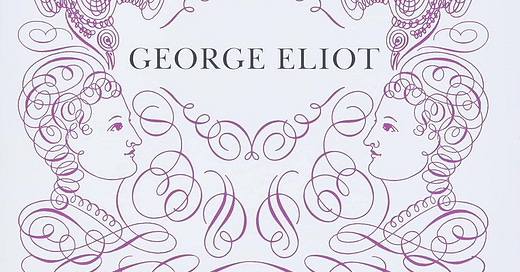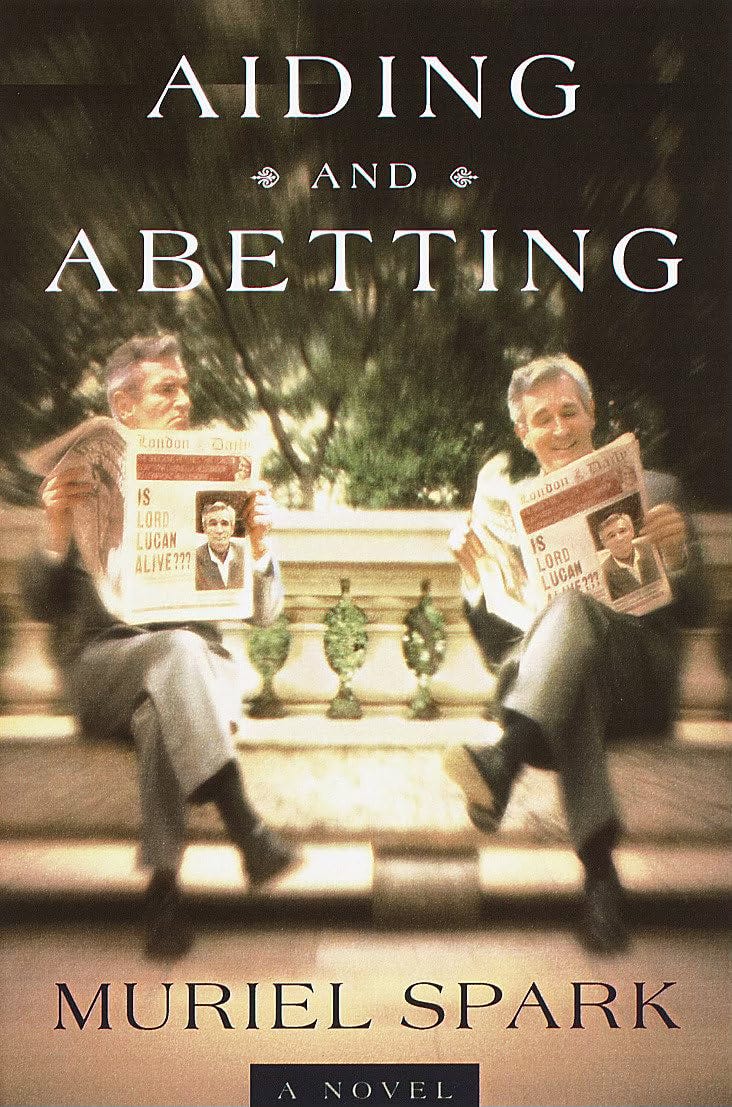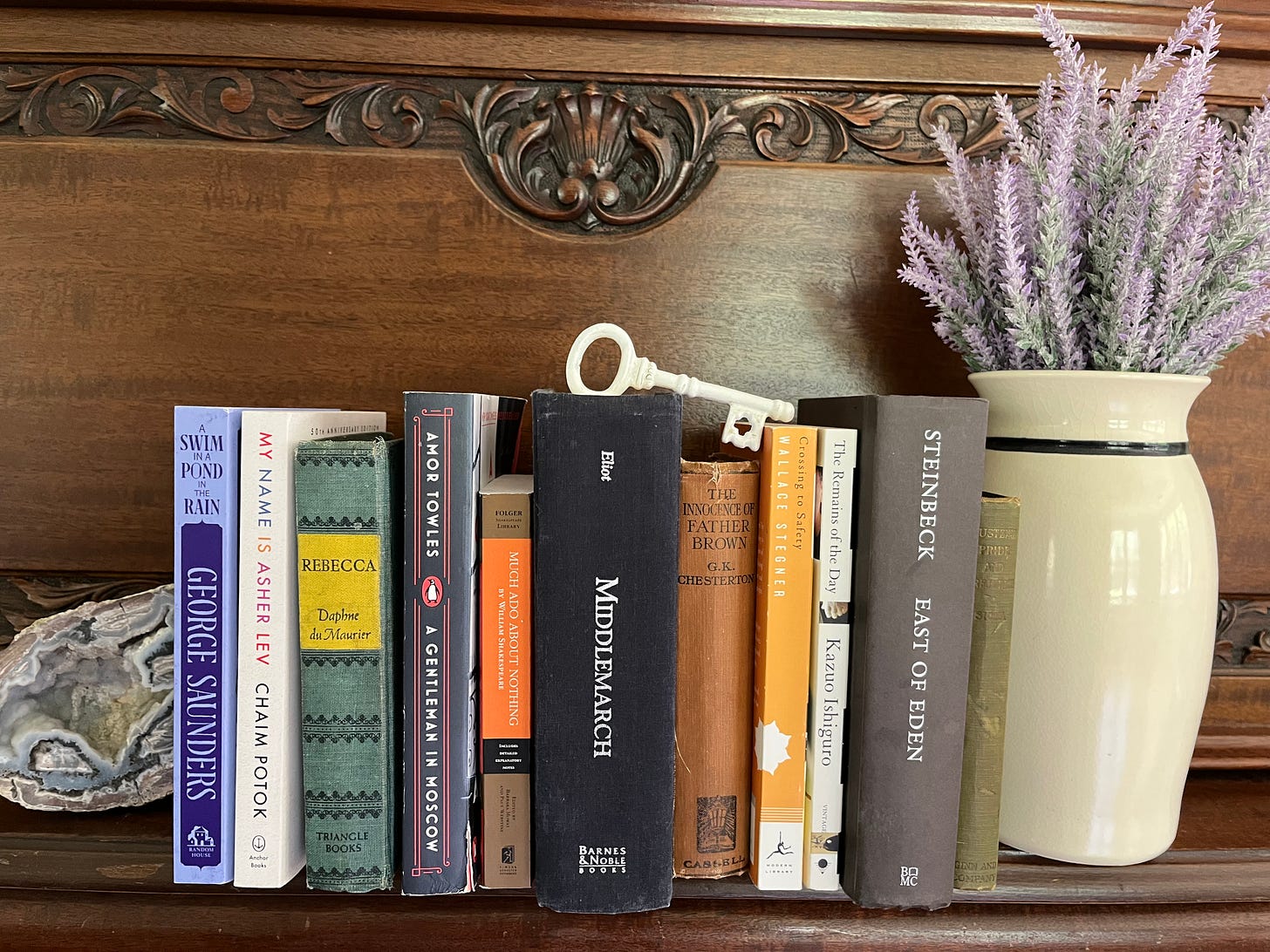Good Morning,
I come to you from the land of “No Sick Kids” finally! It has been a weird week for us due to the sick kids and parents, but I am looking forward to a slow weekend and then back to some normalcy next week. I have been (delightfully) plodding through Middlemarch and The Warden (with
) which are both so good, but slower novels, so I have been enjoying my new routine of picking up a page turner memoir or novel to enjoy over the weekend (see below for last weekend’s delightfully weird pick). I am halfway through another Muriel Spark pick this weekend and will let you know if it’s worth picking up! I hope you all get some time to enjoy some literature this weekend while relaxing with your families too!Now onto business…
Middlemarch Musings
In chapter 12 we go with Fred and Rosamond to meet Mr. Featherstone. We first get to meet his sister who is hilarious with all of her insinuations. I keep finding examples of people wearing masks and this is one. She only insinuates and never says what she means. We find out that Fred is in trouble (though we are still unsure how much is true). At this point I am not sure if Featherstone is being mean or asking for something reasonable from him in going to Bulstrode to prove that the rumors are untrue. We get to meet Mary Garth who is lovely even with her flaws. The comparison that Eliot makes between her and Rosamond is so well drawn. I think I like Mary so much because she sees Fred’s flaws and still seems to love him (though she definitely expects better from him). There is more mask imagery when attention is drawn to Mary’s facial expression when she hears about Fred. Then another mask when we hear that Rosamond is playing herself as a character and doesn’t even know it. The other thing that keeps coming up is mirrors. We see characters seeing themselves in another character (Dorothea and Cassubon, now Fred and Featherstone…in the next chapter Bulstrode and Vincy).
We finally get to meet this Bulstrode we’ve heard so much about in chapter 13. We should definitely be asking questions about his past. I love how Eliot weaves the diet conversation into the larger conversation they have. The omniscient narrator is so helpful in this book because we get to see the outer actions and what is going on in each characters head. Bulstrode sees himself in the mirror of Vincy’s accusations and doesn’t like what he sees.
We come back to Fred and Mary in chapter 14 and she says that she will not marry him to his face. This conversation seems important. And then we find out that Fred is in debt and Mary’s father has co-signed for him. Does Mr. Featherstone seem to be getting meaner?
In chapter 15 Eliot opens with a meta conversation about writing a novel and it is so fun. I love the quote that Rosamond had “fallen in love with, or at least selected (Legate) as a future husband.” Even though Eliot hasn’t mentioned Rosamond directly we get an insight into her mind. I love the description of Lydgate finding a vocation in medicine and his love of books. And then we get the story of Lydgate falling in love with a husband killer!
We learn more about Bulstrode in chapter 16. He is powerful and unliked… “It was a principle with Mr. Bulstrode to gain as much power as possible, that he might use it for the glory of God.”…. this is a scary sentiment. Then we get to hear Rosamond and Lydgate chat about music, which I find particularly interesting after hearing Dorothea and Cassubon talk about music a few chapters back… “none but the ancients can always be classical” … Then we find the two of them having such different thoughts upon leaving! Is this just the difference between men and women?
We now move on to the Farebrother household in chapter 17 and get to meet his hilarious mother. She is always telling everyone what to think lest they think the wrong thoughts. She kind of sounds like a Victorian novelist to me! Eliot leads us to like and trust Farebrother with Lydgate. The way he talks about Bulstrode makes me think of Dorothea, however I dislike Bulstrode and I sympathize with Dorothea. Does this have to do with her age or is it because of how much power Bulstrode yields?
In chapter 18 we come to the vote between Farebrother and Tyke as the chaplain for the hospital. Lydgate “must really hold a court of conscience” with himself. “But whichever way Lydgate began to incline, there was something to make him wince; and being a proud man, he was a little exasperated at being obliged to wince.” He decides to vote with Bulstrode and convinces himself that he isn’t doing this with any selfish motives, but then immediately regrets it and realizes he was definitely being selfish. I loved this quote at the end of the chapter…. “the majority of us scarecely see more distinctly the faultiness of our own conduct than the faultiness of our own arguments, or the dulness of our own jokes.”
Then we are off to Rome in chapter 19 to meet with Will who is very flustered by coming upon Dorothea. His friend wants to paint her for her beauty as a Madonna, but he thinks he would dress her as a nun. The setting (the Vatican) and the previous comparison with Saint Teresa of Avila makes this comment make sense to us. Will’s artist friend says, “you would think of Mistress Second-Cousin (Dorothea) as antique form animated by Christian sentiment- a sort of Christian Antigone- sensusous force controlled by spiritual passion.” Then we see Will get extremely upset, “you and I shall quarrel…if you call that lady my aunt again.” We keep hearing about “Poor Dorothea” and “Poor Cassubon” but I think we can go ahead and add “Poor Will.”
In chapter 20 we finally come back to Dorothea and see her heart sick about her disappointment in her marriage so far, and they are still on their wedding tour. There are so many good quotes in this chapter about the expectations and reality of marriage and George Eliot seems to really understand the psyche of men and women well. There are also so many good quotes about Rome and Protestant/Puritan sentiments….
“…moreover, after the brief narrow experience of her girlhood she was beholding Rome, the city of visible history, where the past of a whole hemisphere seems moving in funeral procession with strange ancestral images and trophies gathered from afar.”
“To those who have looked at Rome with the quickening power of a knowledge which breathes a growing soul into all historic shapes, and traces out the suppressed transitions which unite all contrasts, let them conceive one more historical contrast: the gigantic broken revelations of that Imperial and Papal city thrust abruptly on the notions of a girl who had been brought up in English and Swiss Puritanism, fed on meagre Protestant histories and on art chiefly of the hand-screen sort; a girl whose ardent nature turned all her small allowance of knowledge into principles, fusing her actions into their mould, and whose quick emotions gave the most abstract things the quality of a pleasure of a pain…”
And then at the end of this chapter we find ourselves with a fuller understanding of Dorothea’s state of mind when Will sees her at the beginning of the previous chapter.
This brings us to about halfway through our reading for February. I would love to hear any thoughts you’ve been having about the reading in the comments! Reading in community is so fun!
Other Things I’m Enjoying This Week
If you’ve talked to me in person this week you’ve probably heard me go on about this book already, so forgive me, but I must recommend Muriel Spark’s true crime novel with an imaginative conclusion, Aiding and Abetting. I got this from the library because Muriel Spark’s name kept coming up in literary circles and I wanted to check her out. She’s a Catholic novelist from the lates 1900s and I was curious. I picked this up on a whim when I was home alone with (sleeping) sick kids last weekend and I read it in two quick sittings. I couldn’t put it down. I will warn you that it is weird! But so entertaining and I think has some deeper meaning below the page turner that it is.
This new Substack called The New Jerusalem is a series of letters between Father and Son…
“We are two men—a father and son, one a storyteller, the other a scholar. For as long as we’ve been able to speak together, we have been speaking about these things. In the time that’s left to us, we would like to share our remaining conversations. Informed by tradition, led by faith, inspired by beauty, we are seeking the trailhead of the road to the New Jerusalem. “
- ’s essay on Till We Have Faces (LitBC pick from September 2021)….he describes Joy Davidman’s contribution to the book and its a delightful read.
This list of birthday gift ideas for kids from
We’ve been rewatching Arrested Development and it is so funny and, in my opinion, gets funnier with each rewatch because there are so many understated jokes. If you’ve never watched it before, let me warn you, it is very weird!
And that is about all from me for the week. We’ve got another two weeks (give or take) until our meetings for the first half of Middlemarch so if you need to do some catching up remember there is a free audible version (or version 2 on librivox is good as well). My plan is to keep plodding through at the pace of about 2 chapters each weekday. I have really been enjoying this reading schedule. It helps me to read carefully and enjoy it without feeling like I need to blaze through this contemplative book. There are so many witty descriptions that it would be a shame to miss!
I hope you all get at least a little bit of time this weekend to curl up with a book and see the world anew and come back to your ordinary life refreshed to start again. Books are wonderful things!
Enjoy your reading till we meet again!
“A literary education teaches that human nature is best, if always incompletely, understood through the examination of individual cases, with nothing more stimulating that those cases that provide exceptions that prove no rule- the unique human personality, in other words. A literary education with its built in skepticism about flimsy ideas and especially about large idea systems, is naturally against fanaticism. It provides an enhanced appreciation of the mysteries and complexities of life that reinforces the inestimable value of human liberty- liberty especially of the kind that leaves us free to pursue that reality from which we all live at a great distance and run the risk of dying without having known.”
-Joseph Epstein (On Being Well-Verses in Literature….A Literary Education)
A Few Reminders
Next up for Literature Book Club is The Innocence of Father Brown for April and then Crossing to Safety for May.
If you found your way here and are not part of an in person book club, welcome! We would love you to read along with us. But, in person literary community is a beautiful thing. So please contact me if you’d like to join or start a group!
If you are part of a group, but you’re not on our Slack page, please contact me. That is where people share thoughts and logistics for each in person group.
Book lists from previous years can be found here.
We are now on Facebook, Instagram, and Twitter (with links to Substack) in order to hopefully spread the reading life to more people...if you want to like or share with any friends that want to start their own groups (or follow along virtually) please do!
*As always, some of the links are affiliate links. The few cents(literally) earned with each purchase you make after clicking links (at no extra cost to you) go toward the time and effort it takes to keep Literature Book Club running and I appreciate it!








I'm so so glad you enjoyed my gift guide, Kelsie! And I've even more glad that your kids are feeling better...sickness with kids can be so hard!